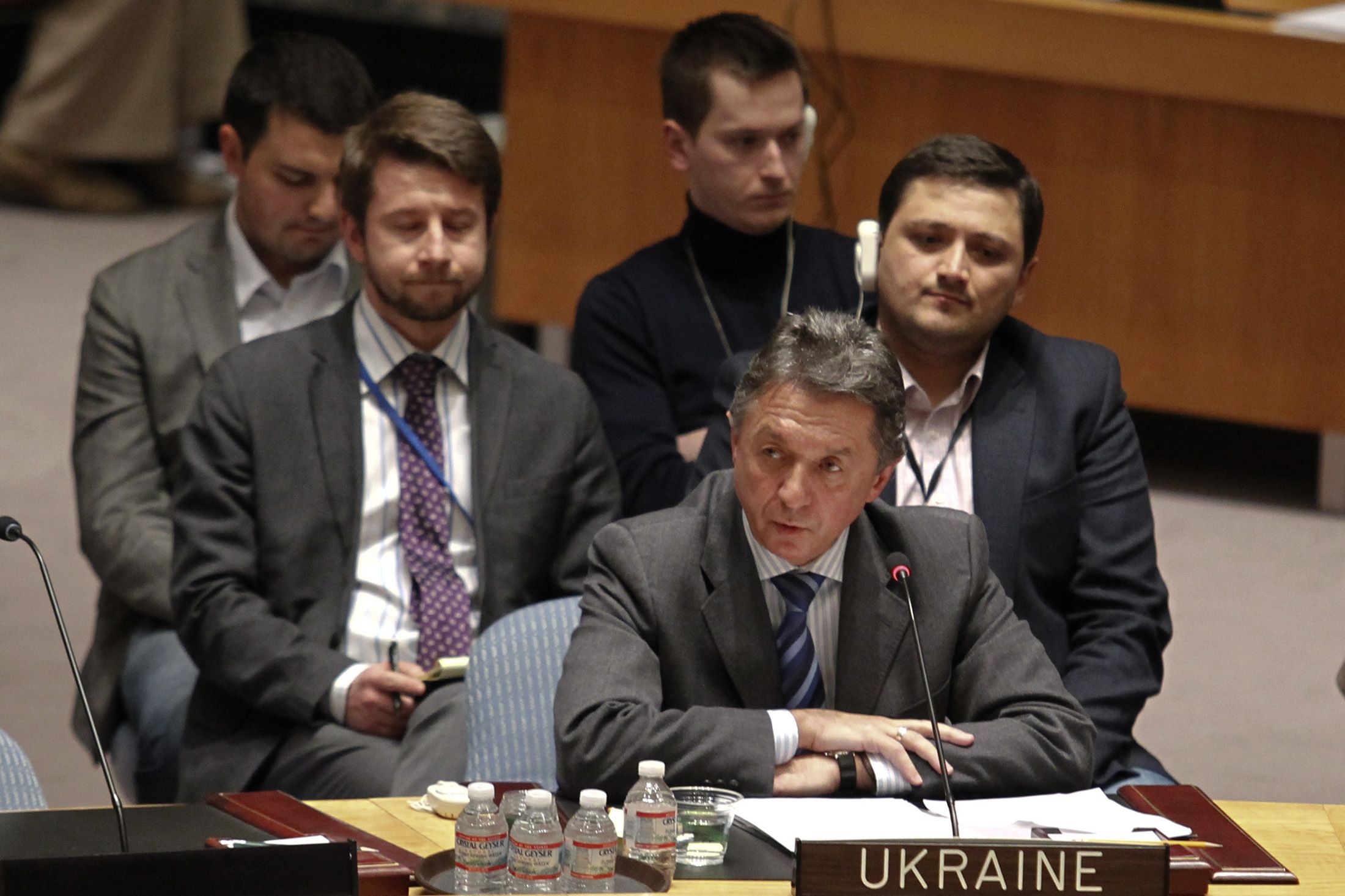
After meeting twice on Friday and Saturday, the Security Council failed to agree on measures to address the Ukraine crisis, even as Western diplomats managed to score a small procedural victory by conducting a public session despite Russia's objections.
Kiev officials said 15,000 Russian troops have already entered Crimea and the Ukrainian UN ambassador, Yury Sergeyev, told the council Saturday, "their numbers increase every hour."
His Russian counterpart, Vitaly Churkin, however, accused the Ukrainian government of violating agreements and escalating the situation.
But beyond accusations and counter-accusations -- the American, British and French ambassadors also spoke in support of the Ukrainian government -- no one expected much movement from the Security Council, where Russia, like four other major world powers, has the power to veto any resolution.
"Part of the problem here is that you don't go to the Security Council as your first act," said one Western ambassador from a country not represented in the 15-member top UN body. "You go to the council after devising a firm strategy and use it as a tool to back it up. Russia has such strategy; the West doesn't."
Mark Lyall Grant, the ambassador of the United Kingdom that called Saturday session, said that the aim was for Russia to explain its legal justification for sending troops to the Crimea.
The American ambassador, Samantha Power, on Friday said Washington supports "international mediation" to the Ukrainian crisis, and on Saturday she added that observers of the Organization for Security and Cooperation in Europe, or the UN, should be sent to find the facts on the ground and bring them back to the Council.
Secretary General Ban Ki-moon earlier said through a spokesman that he had spoken on the phone with Russian President Vladimir Putin. He has designated a Dutch diplomat, Robert Serry, to mediate the crisis,
Serry, a Ukrainian and Russian speaker whose wife is from the Ukraine, was Holland's ambassador in Kiev before he was appointed to his current post as the Secretary General's special envoy to Israel and the Palestinian territories. Churkin, the Russian ambassador, complained on Friday that by spending time on the Ukraine crisis Serry may be neglecting his Middle East duties.
Russia seemed cool to the idea of UN mediation and, after initially planning to go to Crimea over the weekend, Serry on Saturday decided it wouldn't be possible, due to "logistical reasons," Ban's deputy, Jan Eliasson, told the Security Council on Saturday. Instead, Serry flew to Geneva where Ban is planning an annual strategy session, known as a "retreat," with top UN officials on Sunday.
At the same time, a phone call between President Obama and Putin, in which the US, according to the White House, called on Moscow to "de-escalate tensions by withdrawing its forces back to bases in Crimea and to refrain from any interference elsewhere in Ukraine," did not seem to sway the Russian president.
"It is ironic that the Russian Federation regularly goes out of its way in this chamber to emphasize the sanctity of national borders and of sovereignty, but Russian actions in Ukraine are violating the sovereignty of Ukraine and pose a threat to peace and security," Power, the US ambassador, told the council Saturday.
Indeed, western diplomats pointed to at least 11 recent protestations by Moscow when it deemed that others didn't wait for Security Council authorization before launching military action. But the body of agreements and resolutions that make "international law" can at times be less clear cut than national laws and contradicting interpretations often lead to more confusion than clarity.
On Saturday, Churkin accused Kiev of violating the February 21 agreement, chaperoned by European powers, which called for a presidential election in Ukraine in December. The agreement did not hold, as demonstrators demanded the immediate removal of President Viktor Yanukovych.
At the same time, the French ambassador to the UN, Gerard Araud, said Russia had violated the December 21 agreement which it had "refused to observe" from the start.
Similarly, both sides accused each other of violating the 1994 Budapest agreement that entered Ukraine into the nuclear non-proliferation treaty and settled some issues regarding its sovereignty.
While Western ambassadors were accusing Russia of violating the integrity of Ukraine's territory, Churkin cited as legal justifications for Moscow's actions Yanukovych's request for protection and a treaty that Russia has signed with the Ukraine that agreed Russia's military presence in Crimea.
The debate on Saturday, however, started out in a much less elaborate manner. For two hours, Western ambassadors were adamant that rather than a closed-door session, the Council should meet openly, with cameras rolling.
Churkin finally agreed, but at the outset of his speech -- which, unlike other ambassadors he delivered almost without notes -- he complained that his colleagues have violated the agreement. Only the UN deputy and the ambassadors of Ukraine and Russia would speak, he said, before complaining that the US, Britain and France were now also taking the floor.
The session, which as expected ended with no plan of action, underlined the difficulty of using such a divided body as the Security Council to resolve major disputes involving one of its most powerful members.
In Crimea, meanwhile, Russian troops and aircrafts were already creating "facts on the ground."
Uncommon Knowledge
Newsweek is committed to challenging conventional wisdom and finding connections in the search for common ground.
Newsweek is committed to challenging conventional wisdom and finding connections in the search for common ground.





